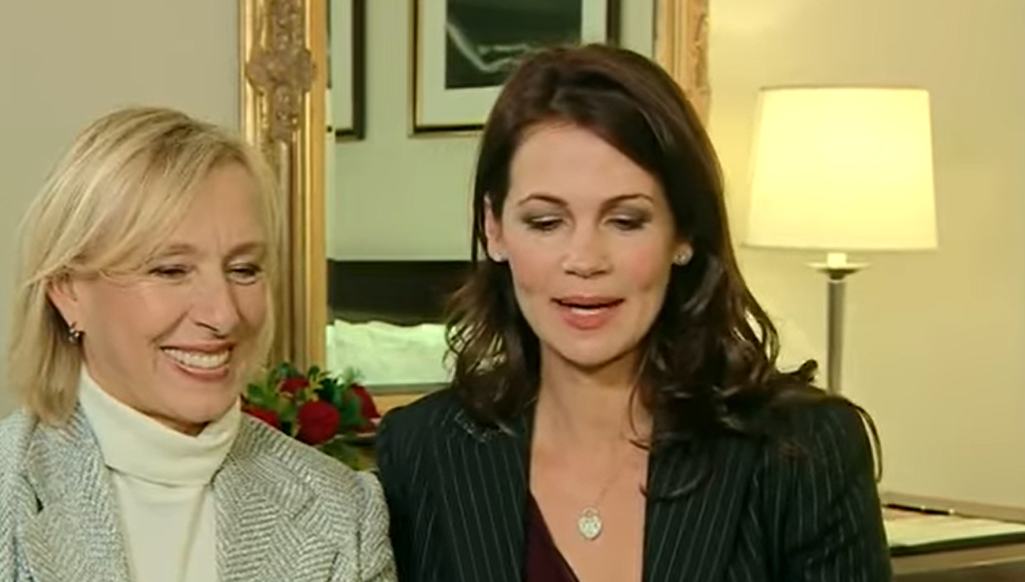In the past year, Martina Navratilova has taken on a role that many did not anticipate, but she has embraced it with the same tenacity and fervor that made her a tennis legend in the first place. At the age of 67, she and her spouse Julia Lemigova are proud parents to two adopted sons following ten years of marriage and years of negotiating life’s unforeseen turns. Despite being extremely personal, this choice has had an impact on society, the media, and the celebrity community.
Their story has been molded by endurance, suffering, and patience; it is not a fast-forward fairy tale. Lemigova revealed her wish to adopt during Season 5 of The Real Housewives of Miami. It seemed appropriate since her daughters were grown and had a loving home waiting for them. However, as the cameras rolled, Navratilova received a devastating diagnosis of cancer. Plans were immediately put on hold. Speaking firmly, Lemigova stated that they had to put Martina’s health first, so adoption had to wait.
Their journey would be based on this type of grounded thinking, which strikes a balance between dreams and reality. Navratilova was declared cancer-free by June 2023. Recuperation brought new life. The couple’s adoption of two young boys in August 2024 marked the beginning of a new chapter in their relationship and in their understanding of what it means to be a family.
Biographical and Family Information
| Name | Martina Navratilova |
|---|---|
| Born | October 18, 1956 – Prague, Czechoslovakia |
| Nationality | Czech-American |
| Profession | Former Professional Tennis Player, Activist |
| Marital Status | Married to Julia Lemigova (since 2014) |
| Children | Two adopted sons (names undisclosed publicly) |
| Age at Adoption | 67 |
| Spouse’s Profession | Julia Lemigova – Former Miss USSR, RHOM Star |
| Notable Awards | 18 Grand Slam Singles Titles, 59 Major Titles |
| Residence | Miami, Florida, United States |
| Verified Source | People Magazine |

It’s not just the fame or the timing that makes their story so powerful. It involves boldly rewriting expectations. Later-life parenthood is frequently written off as impractical. However, Navratilova’s acceptance of it at age 67 is particularly motivating. Instead of retiring in peace, she decided to redefine legacy by raising children with stability, love, and wisdom gleaned from decades of experience.
These boys, who have not yet been publicly identified due to privacy concerns, made their debut in a RHOM teaser trailer, shocking and simultaneously touching viewers. They made a subtle but powerful emotional entrance. They were genuine, happy family members, not plot devices. By showcasing an LGBTQ+ couple creating a home based on nurturing rather than drama, it signaled a sea change for the franchise.
For Lemigova, this represents a return to a role as a mother that has witnessed unfathomable tragedy as well as joy. She lost her son Maximilian to shaken baby syndrome years ago, and she has been painfully honest about it. Instead of hardening her, the trauma increased her awareness of the value and fragility of children’s lives. Her experience gives their parenting more emotional weight now that she and Navratilova are co-parenting.
The idea that family is a choice rather than merely a biological occurrence is what uncannily parallels their story with that of others who adopted later in life, like David Furnish and Elton John. Their home is a prime example of how intentionally and lovingly chosen families can be incredibly resilient. This story adds clarity and hope to the discussion at a time when family structures are changing quickly.
Their story is spreading far beyond tennis or reality TV fandom thanks to social media, fan communities, and RHOM itself. It is reaching older couples thinking about adopting a child, LGBTQ+ youth, and even conservative audiences who are reevaluating antiquated notions of what constitutes a family. That kind of influence is transformative rather than merely cultural.
In addition to raising two boys, Navratilova is guiding a whole generation by entering this new stage with transparency. She is quietly but effectively demonstrating that retirement is not the end of life. It reimagines itself. And for viewers who don’t often see LGBTQ+ families portrayed with complexity and nuance, her reinvention is especially helpful.
The couple’s parenting style is a reflection of their values: love is always prioritized, boundaries are moderated by freedom, and discipline is balanced with affection. Their request for privacy is not motivated by secrecy, but rather by the conviction that kids should be allowed to develop without being subjected to constant public scrutiny.
Lemigova has acknowledged that there have been difficulties acclimating to this new phase. Her older daughters have struggled with the change, serving as a reminder that family blending is never simple. However, their journey gains authenticity from this honesty. They are parenting with a purpose, not curating perfection.
The family story now includes even Navratilova’s cancer recovery. They have decided to view it as a turning point rather than an obstacle. Her survival gave her a fresh perspective on what really matters. She is imparting that wisdom to her sons through adoption, raising them with purpose and not just with care.
Additionally, this choice represents a change in a larger cultural context. Meaningful narratives like theirs are increasingly shaping celebrity parenthood, which has historically been dominated by glossy photos and branded baby gear. This is a movement toward strong, transparent, and empathetic families, not just another headline.
